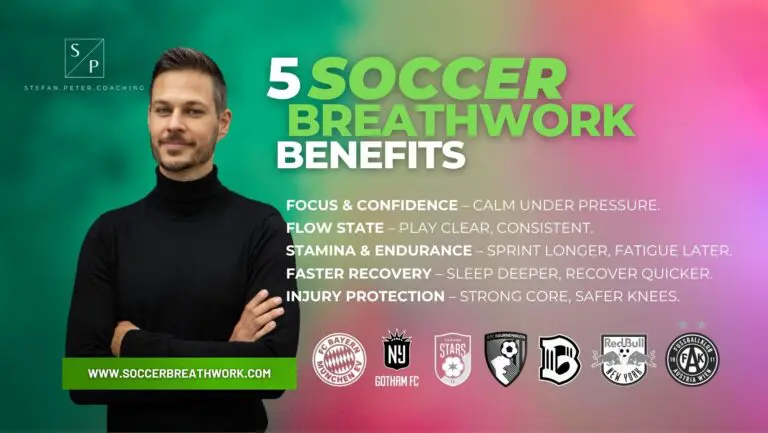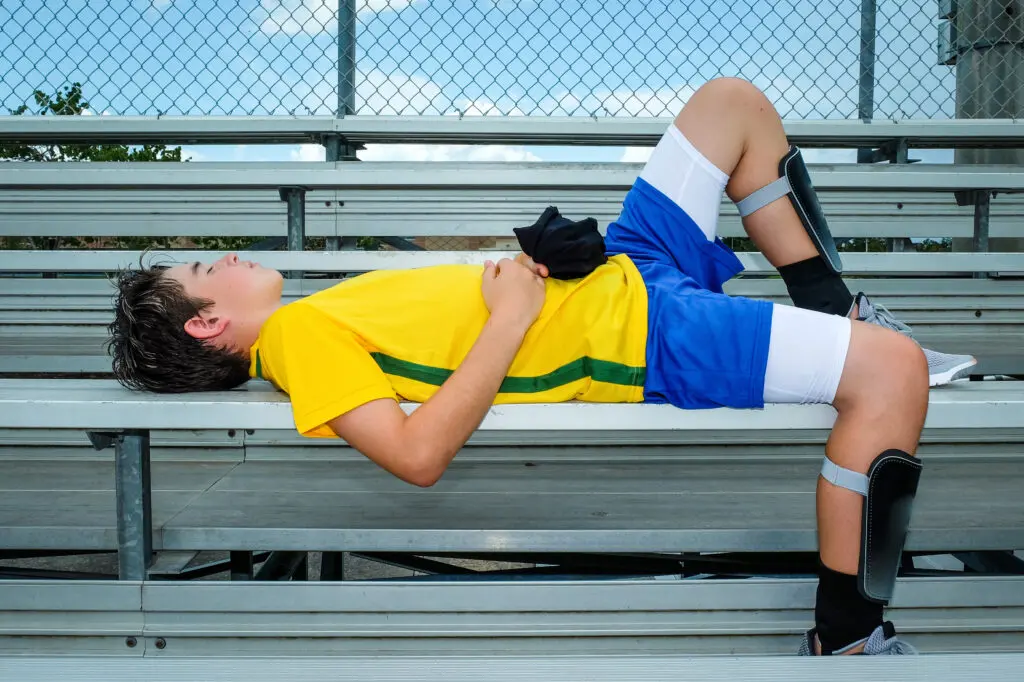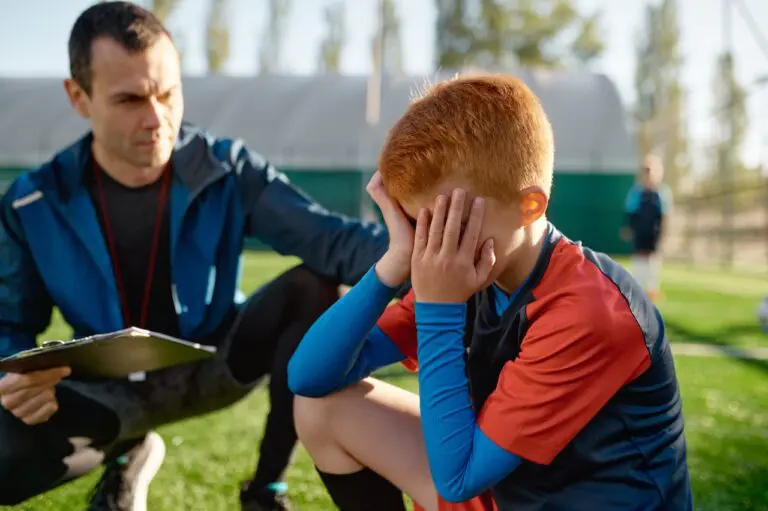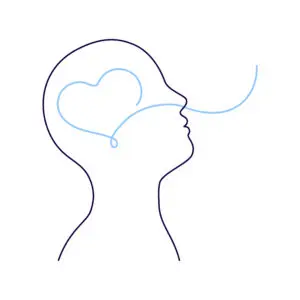Secret Performance & Mindset Hack Parents Should Know

If you’re reading this, chances are you want your kid to perform AND feel good on and off the pitch. Maybe you wish they were more confident, learned to stay more emotionally balanced, play with more consistency and yes, stand out to coaches and scouts.
Breathwork is something that grows in popularity by the day – and performance breathwork can help your player as well – let me explain why!
Here is a little secret – Well it’s actually not a secret to you if you read the recent article Inside the Mind of a Scout (Julio Cesar Gomez, Co-Founder & Academy Director, Madrid Euro Soccer Academy) 75% of a scouting report is based on what your child does when they don’t have the ball. Once a coach says your child has potential, success is no longer just about raw physical talent. From that point on, a lot comes down to their mind and body connection that makes the difference.
Because what separates good players from players that get scouted is simple:
- Starting focused, staying concentrated and locked in – instead of needing 5-6 mins to mentally arrive in the game !
- Avoiding silly mistakes and missing easy chances – due to getting distracted easily a=or gassing out early and getting shaky legs!
- Staying calm and positive even under pressure or after mistakes – performance anxiety is real and it already costs energy before the game and prevents good nights rest.
As a Mental Performance and Breathwork Coach my job is to help players train these qualities. I work with youth and pro players like:
- Mak Whitham (Gotham FC, youngest Pro in NWSL history)
- Katharina Naschenweng (FC Bayern Munich Pro and Austrian International)
- Emiliano Marcondes (former Premier League player, now Norwich City)
(to name just a few.)
How do we start training these qualities in a step by step process – giving us real results within just a few days?
With something everyone already does, but almost no one trains: their breathing.
Why Breathing Matters More Than Most Players and Coaches Realize
Breathing is the fastest and most powerful way to connect the body and the mind. It’s like the remote control of your child’s nervous system. It is the system that supercharges focus and concentration, helps controls stress, balance emotions, speed up recovery by helping sleep better and even help prevent injuries, train endurance and speed. Performance Breathwork how I teach and practice it with my athletes includes 3 pillars.
(You can read more about it on www.soccerbreathwork.com in order not to make this article too long.)
Truth is: 87.5% of athletes, so almost 9 out of 10 breathe dysfunctionally – according to a 2023* study looking at over 1900 pro and semi pro athletes.
This means instead of using their diaphragm – our main breathing muscle – and breathing through the nose, their default style of breathing is shallow, chest dominant and mouth-breathing – especially under stress or fatigue but also already during light warm up, strength and conditioning training and sometimes even sleep. And this has hidden costs you might already be seeing without realizing where it comes from.
Giving your kid 3 concrete breathwork tips:
- Nose breathe during warmup
- Nose breathe during strength or core training
- Practice belly breathing and counting the breath to fall asleep faster
The Hidden Costs of Poor Breathing
If your child is breathing wrong, here’s how it might already be affecting them:
- Slow start into the day and into the game → Feeling tired and sluggish after waking up can be because of mouth breathing during the night. On the pitch it often takes players 5–6 minutes before they feel mentally “locked in.” By then, chances are already missed.
- Silly mistakes → Less oxygen delivery to the brain means poor concentration, slower decisions, and even more errors. Although in Sports Psychology we know focus and concentration are key high performance predictors, we never learn it in school or soccer practice. Therefore most players don’t know how to lock in and enter flow states.
- Gassing out too quickly → Weak breathing muscles mean the diaphragm tires more quickly, and blood is pulled from the legs to help with breathing. But this translates to dropping sprint speed and stamina, feeling exhausted and losing ball control due to shaky legs.

- Performance anxiety → Fast and shallow chest breathing is a societal problem that not only kids know. Skinny waists and flat bellies are still the preferred look, so belly breathing naturally gets thrown overboard because it doesn’t look flattering. Sprinkle some stress on top of it and this habit quickly becomes a signal to the body “I am in danger” This keeps the nervous system in “fight-or-flight” mode, and feeling anxious before games or tests at school.
- Blocked progression → All of the above leads to serious performance blocks. Talent without mental skills leads to inconsistency in performance and performance plateaus. This is exactly what scouts and coaches notice and base their decisions on.
In short: poor breathing = lost potential.
The Physical Side Parents Should Care About
Breathing doesn’t just affect thoughts, emotions and focus - it directly impacts your child’s body.

ACL Injuries
Soccer has one of the highest ACL injury rates, especially for girls, who are 2–6 times more likely to suffer a tear. One overlooked factor? Core stability.
Your child’s diaphragm (main breathing muscle) is part of the core. When it’s weak, the “core canister” collapses, forcing knees and hips to take the load. Research shows poor trunk stability can triple ACL risk. Strong breathing = stronger core = safer movement.
Sleep & Recovery
After matches, many kids are wired, replaying mistakes in their head. Most of us have never learned how to get out of the raising mind and stop overthinking. Without quality sleep, growth, recovery, and mood all suffer.
Oxygen Delivery
Most think breathing more and faster is helpful. But the opposite is true. It’s about breathing right. And breathing right starts with realizing our breath has different gears – like in a car – in case you are used to driving stick. But even if you don’t you know gear 1 is slower than gear 3 or 5. Breathing has 3 gears. 1 is for going slow – its nose in nose out. 2 is for going a bit faster – nose in and mouth out and gear 3 is for going to the max – mouth in and mouth out.
The problem is most athletes, no matter how young, switch to some sort of mouth breathing (gear 2 or 3) already when they are only doing their warmup, light jogging or when they workout in the gym. But this has one significant side effect almost nobody knows about. This type of over breathing blows off too much CO2 too quickly. It’s the exact reason why you feel a bit dizzy when you start hyperventilating.
Oxygen travels on red blood cells (like buses), but doesn’t automatically fuel muscles or the brain. It needs CO₂ as the signal to be released. When mouth breathing blows out too much CO₂, the oxygen stays “stuck on the bus.” – this is called the Bohr Effect. The result? Not enough oxygen although you are breathing like cray – tired legs, brain fog, slower reactions.


Proof from the Pros: Steph Curry
Even the world’s best athletes know this. Take Steph Curry, arguably the greatest shooter in basketball history.
Curry incorporates breath training into every single practice. He even finishes workouts by lying down with sandbags on his stomach, strengthening his breathing muscles by breathing against it.
Why? Because he knows stronger diaphragm = stronger core + better and faster recovery after session + more focus and concentration + no “gassing out” late in games. If Steph Curry, Novak Djokovic, Christiano Ronaldo… – all at the very top of their game – invest in breath training, imagine what it could do for your child’s consistency, safety, and confidence in soccer.
Why Soccer Players Struggle Most
Soccer is brutal on the body and mind because it combines:
- Continuous running for 90+ minutes.
- Explosive sprints and sudden changes of direction.
- Constant decision-making under pressure.
- Emotional swings after mistakes, referees, or goals.
Without trained breathing, kids lose focus, composure, and consistency – exactly the qualities scouts and coaches value most.
👉 Your child’s talent might get them noticed. But their resilience, focus, and mental toughness will determine if they stay at the top.
The Takeaway for Parents
Breathing isn’t just about air. For young soccer players, it’s about:
- Energy → oxygen delivered where it’s needed most.
- Safety → stronger core, fewer injuries like ACL tears.
- Recovery → deeper sleep, faster bounce back after games.
- Focus & Confidence → calmer mind, sharper decisions under pressure.
So while you’re investing in better cleats, private coaching, or nutrition, remember this: the missing key might already be right under your child’s nose.

Stefan Peter,
MAS in Sports Health and Leadership and Pro Soccer Mindset Coach
